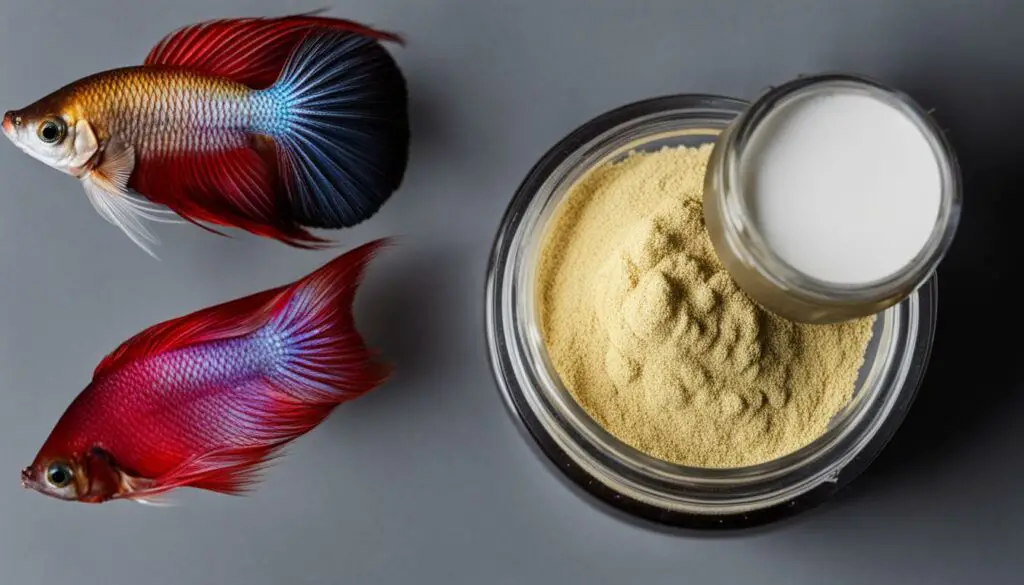Last Updated on 2 years by admin
If you own a betta fish, it’s crucial to maintain their health and well-being. Unfortunately, these beautiful aquatic pets are susceptible to bacterial and fungal infections that can cause serious health issues. In this comprehensive guide, we will walk you through using tetracycline to effectively treat your betta fish’s health issues and keep them in optimal condition.
Key Takeaways:
- Tetracycline is a medication commonly used to treat bacterial and fungal infections in betta fish.
- Proper dosage and administration of tetracycline is essential for effective treatment.
- It’s important to keep your betta fish’s environment clean and well-maintained to prevent health issues.
- Consulting with a veterinarian is always recommended for personalized advice and care for your betta fish.
- Alternative treatments and natural remedies can also be considered for maintaining betta fish health.
Understanding Tetracycline for Betta Fish
If you are a Betta fish owner, you know how important it is to keep your aquatic pet healthy and happy. However, despite providing the best care, Betta fish can still develop bacterial infections and other health issues. This is where tetracycline comes in handy as it is a useful medication that can treat a variety of fish health problems.
Tetracycline is a broad-spectrum antibiotic that is effective against a wide range of bacterial infections. It works by inhibiting the growth of bacteria, thus giving your Betta fish’s immune system a chance to fight off the infection. It is available in various forms such as capsules, powder, and liquid, and can be easily administered to your Betta fish.
The Benefits of Tetracycline for Betta Fish Care
Tetracycline is an essential medication that can help treat various Betta fish health issues, such as fin rot, mouth fungus, and popeye. It is highly effective and can show visible improvements in your fish’s condition within a few days of use. Unlike other medications, tetracycline is relatively safe for use and has minimal side effects, making it a popular choice among Betta fish owners. However, it is important to use tetracycline correctly and under the guidance of a veterinarian to avoid any harm to your Betta fish.
Where To Buy Tetracycline for Betta Fish Care
Tetracycline is available at most pet stores that sell fish medications. However, it is essential to check the expiration date and verify the dosage before purchasing. Additionally, it is advisable to purchase tetracycline from a trusted source to ensure its quality and authenticity.

Note: Before administering tetracycline to your Betta fish, it is crucial to identify the specific health issue affecting your pet. A misdiagnosis or improper use of medication can worsen your fish’s condition.
Now that you understand the basics of tetracycline and its benefits for Betta fish care, let’s move on to identifying bacterial infections and how to administer tetracycline correctly.
Identifying Bacterial Infections in Betta Fish
To effectively treat bacterial infections in betta fish, it’s important to first identify the signs and symptoms. Some common indicators include:
- Loss of appetite
- Swimming lethargically or struggling to swim
- Clamped fins
- Red or inflamed areas on the body
- Frayed or disintegrating fins and tail
- White, gray, or yellow patches on the body or fins
- Excessive mucus secretion
If you notice any of the above symptoms, it’s crucial to isolate your betta fish immediately to prevent the spread of the bacterial infection.
Betta fish antibiotics, such as tetracycline, are highly effective in treating bacterial infections. However, it’s important to note that not all antibiotics are suitable for all types of bacterial infections. Therefore, before administering any medication, consult a veterinarian or do thorough research. Incorrect use of antibiotics can lead to drug resistance, which can be dangerous for your betta fish’s overall health.
Note: Some bacterial infections can also be caused by poor water quality in the tank. So, ensure that water quality is properly maintained. Regular water changes, correct water temperature, and proper filtration can reduce the likelihood of bacterial infections.

“Bacterial infections can be fatal for betta fish. If you’re unsure or struggling to identify the symptoms, consult a veterinarian or a fish care professional.”
Administering Tetracycline to Betta Fish
Once you have identified a bacterial infection in your betta fish, it’s essential to administer tetracycline correctly to ensure that your fish gets the right treatment. It’s crucial to follow the correct dosage requirements and frequency of treatment to maximize the effectiveness of tetracycline.
Tetracycline Dosage for Betta Fish
The dosage of tetracycline for betta fish varies depending on the severity of the infection and the size of the fish. As a general rule, the recommended dosage is between 250 to 500 mg of tetracycline per gallon of water for five to ten days.
However, it’s best to consult with a veterinarian or a professional fish expert to determine the exact dosage needed for your betta fish.
Treating Betta Fish with Tetracycline
There are several methods of administering tetracycline to your betta fish, including:
- Water bath: Dissolve the tetracycline in water before adding it to the betta fish tank. Let the fish soak in the medicated water for the recommended amount of time.
- Food: Tetracycline can also be mixed with betta fish food. This method is ideal for picky eaters who may not be willing to take medication orally.
- Oral medication: Administering tetracycline orally using a dropper is an effective way to ensure that your betta fish receives the correct dosage.
Betta Fish Medication – Tips to Remember
When administering tetracycline to your betta fish, it’s essential to keep the following tips in mind:
- Remove any carbon filtration from the tank before administering tetracycline, as it can absorb the medication and reduce its effectiveness.
- Monitor your betta fish during treatment for any signs of adverse reactions, such as lethargy or loss of appetite. If such reactions occur, stop treatment immediately and consult with a veterinarian or fish expert.
- Complete the full course of medication even if your betta fish starts to show improvement after a few days.
By following these guidelines, you can effectively treat bacterial infections in your betta fish using tetracycline. Always consult with a professional fish expert or veterinarian for personalized advice and care for your betta fish.

Treating Betta Fish Fungus with Tetracycline
Like bacterial infections, fungal infections are a common health issue that can affect betta fish. Thankfully, tetracycline can be an effective treatment option for fungal infections as well.
Before administering tetracycline for a fungal infection, it is important to ensure that the diagnosis is correct. Fungal infections in betta fish often appear as white or gray patches on the body, fins, or gills. In addition, infected fish may exhibit sluggish behavior, appetite loss, and clamped fins.

Once a fungal infection has been identified, the next step is to administer tetracycline to your betta fish. The dosage and frequency will vary depending on the severity of the infection, but following the instructions on the medication package is crucial.
It is important to note that if the fungal infection has progressed too far, tetracycline may not be effective. In this case, it may be necessary to consult with a veterinarian for alternative treatment options.
In addition to administering tetracycline, it is also important to maintain a clean and healthy environment for your betta fish. This includes regular water changes, proper filtration, and avoiding overfeeding.
By promptly identifying and treating fungal infections with tetracycline, as well as maintaining proper care for your betta fish, you can help ensure their overall health and well-being.
Precautions and Considerations
Using tetracycline for betta fish can promote their health, but it is essential to consider some precautions and factors to ensure the best results.
Water Quality
Before administering tetracycline to your betta fish, make sure to maintain their tank’s water quality. Poor water quality can weaken their immune system, making them more susceptible to infections. Use a water testing kit to monitor the pH, ammonia, nitrate, and nitrite levels and change their water regularly.
Potential Side Effects
While tetracycline is generally safe for use in betta fish, some side effects may occur, such as loss of appetite, lethargy, and discoloration of fins and body. If you observe any of these symptoms, discontinue the treatment and consult with a veterinarian for alternative solutions.
Interactions with Other Medications
Tetracycline may interact with other medications, such as antacids and iron supplements, reducing its effectiveness. Avoid administering tetracycline with these medications or consult with a veterinarian for advice on alternative solutions.

Remember to always use tetracycline as directed and consult with a veterinarian for personalized advice and care for your betta fish. By considering these precautions and factors, you can ensure that your betta fish remains healthy and free from any health issues.
Supporting Betta Fish Health Beyond Tetracycline
While tetracycline is an effective treatment option for bacterial and fungal infections in betta fish, it is crucial to maintain their overall health through proper care.
First and foremost, it is important to provide a clean and healthy environment for your pet fish. Regular water changes and a proper filtration system can help prevent stress and disease. It is also important to maintain a balanced diet, ensuring your betta fish receives all the necessary nutrients they need to stay healthy.
In addition to proper care, regular check-ups with a veterinarian can help prevent and detect any health issues before they become serious. A veterinarian can also provide advice on specific care requirements for your betta fish, including water quality, diet, and medication.
It is important to note that some health issues in betta fish may not require medication, and can instead be treated through natural remedies. For example, some fish owners have had success treating fin rot through a combination of aquarium salt and clean water. However, it is important to research and consult with a veterinarian before attempting any natural remedies.
Table: Common Betta Fish Health Issues and Treatments
| Health Issue | Treatment |
|---|---|
| Bacterial Infection | Tetracycline, Ampicillin |
| Fungal Infection | Tetracycline, Methylene Blue |
| Parasites | Praziquantel, Metronidazole |
| Fin Rot | Aquarium Salt, Clean Water |

Overall, providing proper care and attention to your betta fish’s health can greatly improve their quality of life. By following these guidelines and consulting with a veterinarian when necessary, you can ensure that your pet fish remains happy and healthy.
Alternative Treatments for Betta Fish Health
While tetracycline is a commonly used medication for betta fish health, there are alternative treatments that can be considered to maintain and improve the well-being of your aquatic pet.
1. Salt Treatment: Salt treatment is a popular alternative to medications for treating common bacterial and parasitic infections in betta fish. The salt bath can be made by dissolving aquarium salt in a separate container filled with water, then adding the betta fish and leaving them for up to 30 minutes.
2. Tea Tree Oil: Tea tree oil has powerful antifungal and antibacterial properties and can be used to treat a variety of betta fish illnesses. It can be added in small doses to the betta fish’s tank, but be sure to follow dosage instructions carefully.
3. Aloe Vera: Aloe vera is a natural and effective remedy for treating various betta fish health issues, including fin rot and fungal infections. It can be added to the tank in small quantities, and its anti-inflammatory and antibacterial properties will help improve your fish’s health and overall well-being.
4. Probiotics: Probiotics are beneficial bacteria that can be added to your betta fish’s diet to help maintain a healthy gut and prevent bacterial infections. They can be purchased in powder or liquid form and added to the betta fish’s food or tank.
Choosing the Right Treatment
When considering alternative treatments for your betta fish, it is important to note that not all remedies are suitable for all illnesses. It is crucial to identify the specific health issue and research the appropriate treatment, dosage, and frequency of use. Additionally, it’s important to consult with a veterinarian to make an informed decision about the best course of action.
Remember, maintaining your betta fish’s health requires proper care, attention, and regular check-ups. By providing a balanced diet, a clean and healthy environment, and prompt treatment when necessary, you can help your betta fish live a long, healthy life.

Conclusion
In conclusion, using tetracycline for betta fish is a vital part of maintaining their overall health and well-being. By understanding the medication’s proper usage, identifying bacterial and fungal infections, and administering treatment correctly, you can help ensure that your betta fish stays healthy and happy.
It’s essential to keep in mind the precautions and considerations when using tetracycline for your betta fish, such as maintaining water quality and being aware of potential side effects. Additionally, supporting your betta fish’s health beyond medication through proper care, such as providing a balanced diet and regular check-ups, is crucial.
Natural Remedies and Alternative Treatments
While tetracycline is a commonly used medication for betta fish health, there are alternative treatments and natural remedies to consider. Consulting with a veterinarian for personalized advice can help you determine the best course of action for your betta fish’s needs.
Remember, the goal is to keep your betta fish healthy and happy, and with the proper care, attention, and treatment, you’ll be able to do just that!
FAQ
How often should I administer tetracycline to my betta fish?
The frequency of tetracycline administration depends on the severity of the infection. Generally, it is recommended to treat betta fish with tetracycline for 5-7 days. Follow the instructions provided with the medication or consult a veterinarian for specific guidance.
Can I use tetracycline to treat other types of fish?
Tetracycline is primarily formulated for betta fish and may not be suitable for other fish species. It is best to consult an aquatic veterinarian for appropriate treatment options for other types of fish.
How do I know if my betta fish has a fungal infection or a bacterial infection?
Differentiating between fungal and bacterial infections can be challenging as the symptoms may overlap. It is recommended to observe the appearance of the infection and the behavior of the fish. If you are uncertain, consult a veterinarian for accurate diagnosis and treatment guidance.
Are there any side effects of using tetracycline for betta fish?
Tetracycline is generally safe when used as directed. However, some fish may be more sensitive to the medication, and side effects such as loss of appetite or discoloration may occur. If you notice any adverse reactions, discontinue the use of tetracycline and consult a veterinarian.
Can I combine tetracycline with other medications?
It is generally not recommended to combine tetracycline with other medications without consulting a veterinarian. Some medications may interact with tetracycline, leading to adverse effects or decreased effectiveness. Always seek professional advice before combining medications.
How can I create a healthy environment for my betta fish?
To create a healthy environment for your betta fish, maintain a stable water temperature, regularly clean the tank, and provide proper filtration. Ensure the water parameters are within the appropriate range and avoid overcrowding the tank. A balanced diet and regular water changes are also crucial for betta fish health.
Are there any natural remedies I can use instead of tetracycline?
While tetracycline is an effective treatment option, some natural remedies like aquarium salt or Indian almond leaves can help maintain betta fish health. However, it is important to note that natural remedies may not be as effective for severe infections, and professional advice should be sought for appropriate treatment.
Can I use tetracycline as a preventive measure for betta fish health?
Tetracycline should not be used as a preventive measure unless specifically prescribed by a veterinarian. It is important to focus on maintaining a clean and healthy environment, providing a balanced diet, and monitoring the well-being of your betta fish regularly.

